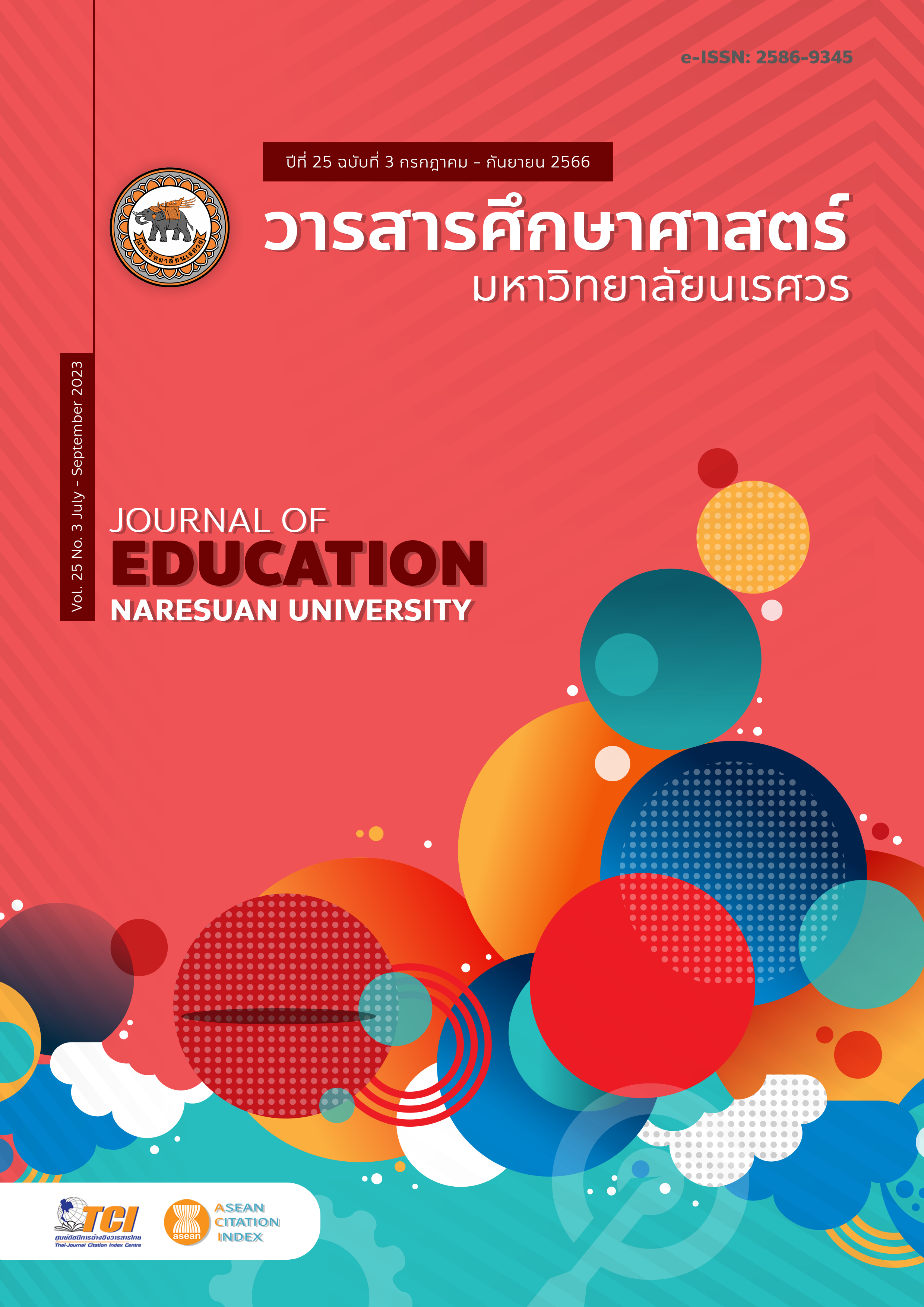THE EFFECT OF SATIT PSU STEM INNOVATION AS PROJECT-BASED LEARNING IN THE DESIGN AND DEVELOPMENT OF AN EXPERIMENTAL SET APPROACH BY GRADE 10TH STUDENTS ON PROBLEM - SOLVING SKILLS AND PHYSICS’ LEARNING ACHIEVEMENT ผลการจัดการเรียนรู้แบบโครงงาน SATIT PSU STEM INNOVATION ในการออกแบบพัฒนาชุดทดลองของนักเรียนชั้นมัธยมศึกษาปีที่ 4 ที่มีต่อความสามารถในการแก้ปัญหา และผลสัมฤทธิ์ทางการเรียนวิชาฟิสิกส์
Main Article Content
Abstract
This research aimed to study the effect of applying SATIT PSU STEM INNOVATION, in which project-based learning which was designed by grade 10th students, it has the effects on the development of an experimental set approach on the problem - solving skills and physics’ learning achievement. Furthermore, the sample was selected from the students of 10th grade at Demonstration School Prince of Songkla University. In the addition, the sample students had been learning for 16 hours. The research instruments consisted of three; the lesson plan which integrated with SATIT PSU STEM INNOVATION as project-based learning; the design of development of experimental set; By the topic “Work and Energy”. And the achievement test of physics subject. Including, problem-solving skills test. The experimental research was conducted by using a single group of students through pretest-posttest design. Thus, the data was analyzed by mean, standard deviation and t-test dependent group. The results had shown as follows: the students who leaned by integrating SATIT PSU STEM INNOVATION project-based learning in the design of the development of an experimental set; By the topic “Work and Energy”, had gained mean score 22.22% of the students who were in primary level, 41.67% of the students who were in the medium level, and 22.22% of the students were in high level and 13.89% of the students were in very high level. Therefore, the students' mean score of the post-test on physics learning achievement and problem- solving skill was higher than the pre-test mean score at the significant level of .01.
Article Details

This work is licensed under a Creative Commons Attribution-NonCommercial-NoDerivatives 4.0 International License.
The owner of the article does not copy or violate any of its copyright. If any copyright infringement occurs or prosecution, in any case, the Editorial Board is not involved in all the rights to the owner of the article to be performed.
References
Besa, N. (2014). Effects of STEM Education approach on biology achievement, problem solving ability and instructional satisfaction of grade 11 students (Master thesis). Pattani: Prince of Songkla University. [in Thai]
Chaibuadang,N. (2018). The study of learning achievement and attitude towards Physics learning for grade 11 students using STEM education. Ubon Ratchathani: Ubon Ratchathani University. [in Thai]
Kanjanawasee, S. (2014). Gain Scores. Research journal the social science research association of Thailand, 1(1), 12-13. [in Thai]
Khongsook, S., Thumthong, B., & Pradabsri, P. (2019). The development of stem education activities to promote problem solv-ing ability and learning inquiry behavior for matthayomsuksa three students kapchoengwittaya school, Journal of Education, Silpakorn University, 16(2), 201-212. [in Thai]
Kuaklung, K., Kessaratikoon, P., & Prasitpong, S. (2018). The study of achievement by stem education on equilibrium and elasticity for grade 11 students. Journal of Education Thaksin University, 18(2), 124-135. [in Thai]
Manui, M. (2014). The development of mechanics experiment package for mattayom 4 student in Phatthalung school (Master thesis). Songkhla: Songkhla Rajabhat University. [in Thai]
Mulhayatiah, D., Suhendi., H. Y., Zakwandi, R., Dirgantara, Y., & Ramdani, M. A. (2018). Moment of inertia: development of rotational dynamics KIT for physics Students. [Proceeding]. 3rd Annual Applied Science and Engineering Conference, 3(1), 1-8.
National STEM Education Center, NSEC. (2015). STEM Network [Manual]. Bangkok: The institute for the Promotion of Teaching Science and Technology. [in Thai]
Netwong, T. (2016). Development of problem-solving skills by integration learning following STEM Education. Research Journal-Rajamangala University of Technology Thanyaburi, 15(2), 1-6. [in Thai]
Nilalad, S. (2019). A development of problem -solving skill of mathayomsuksa 4 students at Muangbuawittaya School by using integrated STEM learning unit emphasizing engineering design process (Master thesis). Buriram: Buriram Rajabhat University. [in Thai]
Polpool, S. (2011). Developing an experimental set on sound wave for mutthayomsuksa V student (Master thesis). Ubon Ratchathani: Ubon Ratchathani University. [in Thai]
Prabsoongnern, O. (2018). Effect of learning according to the concept and full study (STEM Education) on science learning achievement in Living things and problem-Solving Ability and Instructional Satisfaction of Pratomsuksa 4 students (Research report). Chiang Mai: Bureau of Education Chiang Mai Municipality. [in Thai]
Ruengrung, S., Sukmas, T., & Kaewtubtim, P. (2020). The development of practical manual for creating experimental package on applying law of conservation of energy in calculation on moment of inertial. [Proceeding]. Teacher Professional Innovation", The 3rd Network of Teacher Production Institutions in the Lower Southern Region,1(5), 1-13. [in Thai]
Salaeh, N. (2017). Effect of STEM Education on chemistry achievement, analytical thinking ability and instructional satisfaction of grade 10 students. Pattani: Prince of Songkla University. [in Thai]
The institute for the Promotion of Teaching Science and Technology. (2019). Physics teaching purpose. Retrieved May 3, 2019, from http://physics.ipst.ac.th/?page_id=2310
Thepnurat, M. (2017). Thai-Active Physics. Thai Journal of Physics, 35(2), 56-60. [in Thai]
Visetsuvarnabhumi, K. (2019). SATIT PSU STEM INNOVATION project-based learning [Handout]. Pattani: Faculty of Education Prince of Songkla University. [in Thai]
Weir, J. J. (1974). Problem Solving is Everybody’s Problem. The Science Teacher, 4(1), 16–18.
Wongchachom, P., & Cojorn, K. (2016). A development of creative thinking and learning achievement of matthayomsueksa 5 students based on the STEM Education cooperated with project-based learning. Journal of Education, Mahasarakham University, 10(Special Edition), 465-474. [in Thai]


